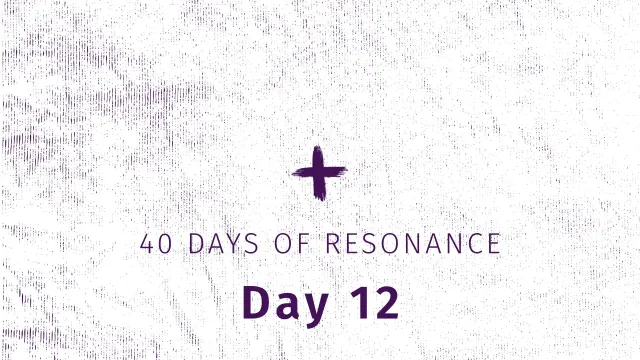It's amazing what happens in people when Jesus turns them from the earthly to the fullness of what He's come to do.

I've been taking about half a chapter of John's Gospel account per post here in these 40 days, but I'm going to need another day in John 6, or else this would be a far-too-lengthy (for this purpose) post.
Immediately following the sign of the feeding of the many thousands, we see another sign: Jesus walking on the water, calming the sea which was both a demonstration of His Kingship over even nature but also a theological sign to the disciples that the place of chaos and terror (the sea) was being overcome by Jesus.
And (I would argue) there was another sign, which is usually easily missed in the English because few. There's some debate about how intentional the language was from Jesus about the eucharist later on in John 6 (we'll get to that tomorrow), but I think the same debate needs to be had about Jesus' statement while on the water which was intended to calm the fears of the Twelve in the boat: Jesus saying "'ἐγώ εὶμι", which is sometimes used to simply mean "It is I" but it's also used specifically when Jesus uses for Himself the Divine name "I AM" (e.g. John 8:58, also the Greek phrase that's used to translate the personal name of God in the Septuagint, the Greek translation of the Old Testament). My take on it is that it's John doing a both/and, which is characteristic.
OK, that was a bit of insider language, but it's a different way of making the point that Jesus indeed claimed to be God (are you sensing a pattern here?). It may seem odd to have this account on the sea inserted in between extended discourse about the feeding and bread, but it does make sense. (And, in terms of the story, it does explain how Jesus and the Twelve ended up on the other side of the lake.)
And that takes us forward into the next piece of the story. You may be literally turning the page during these verses if you're reading John's Gospel account in a paper Bible, but Jesus is also turning the page for the people; turning once again—now in a more pointed way—from only the earthly to the fullness of what He's doing, from the sign to the thing (the One) signified. Jesus now rightly accuses the crowds of following Him only for earthly reasons, and begins to turn them away from the earthly towards Himself.
When He gets to the heart of the matter, things take a huge turn (again, we'll get to that tomorrow). Jesus says, in essence, you're only wanting more bread. But you need to realize that the bread was a sign pointing to me. I'm the Bread of Life; come to Me and and find true satisfaction. Don't get so fixated on the signs that you miss what (Who!) the signs are pointing to.
We today would do well to remember that last sentence too. Don't get so fixated on the gift that we forget the Giver. Don't get so fixated on the earthly that we miss the eternal. It's not that the earthly isn't important; it's just not all-important. Sadly, we've seen much within Christianity that would give the impression that the earthly things are all-important, that Jesus is just a means to the true end: a happy, comfortable, easy life here on earth. But Jesus is the Bread of Life, which is something far more—and far, far better—than any earthly thing we could ever imagine.
